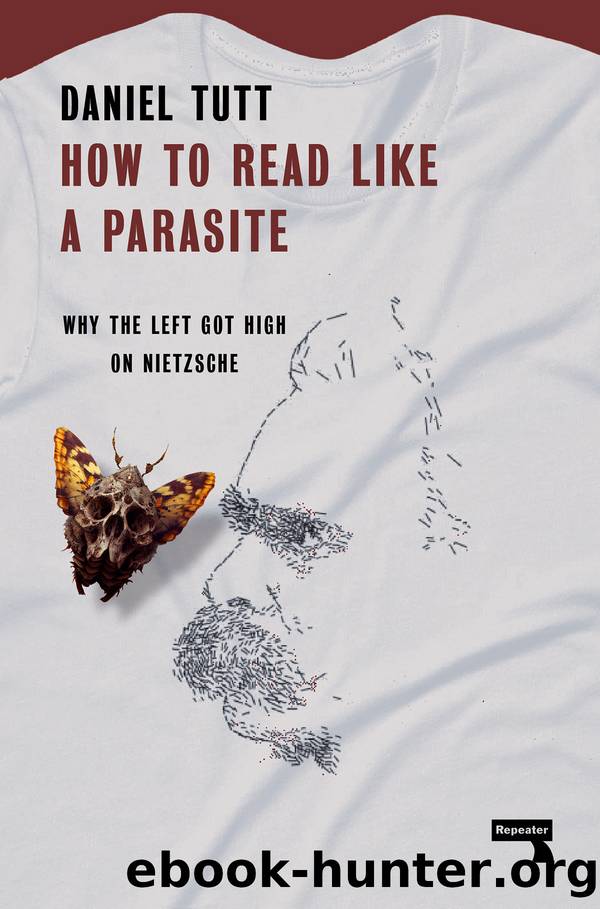How to Read Like a Parasite by Daniel Tutt

Author:Daniel Tutt
Language: eng
Format: epub
ISBN: 9781915672261
Publisher: Watkins Media
Published: 2023-01-15T00:00:00+00:00
Deleuzeâs Nietzsche: The Counterculture Rebel
One of the most influential incorporations of Nietzsche on the left is found in the work of post-war French philosopher Gilles Deleuze. Deleuzeâs embrace of Nietzsche is different than that of any of the thinkers on the left we are discussing in this chapter in that he sought to center Nietzsche as the primary philosopher. But Deleuze read Nietzsche in a highly idiosyncratic and singular way as offering a toolbox of concepts for experimentation. Deleuze affirms that the greatness of Nietzsche is not found in how he interprets history or philosophy and nor does he offer any source of meaning. This leads Deleuze to develop a highly creative appropriation of Nietzsche, which he applies to the history of philosophy, and places Nietzsche at the center of his political thought.
We will begin by assessing Deleuzeâs Nietzsche in an essay called âNomad Thought,â published in 1962, the same year as his major work Nietzsche and Philosophy. In it, Deleuze lays out the political function of his Nietzsche more explicitly than in any of his other works. âNomad Thoughtâ is Deleuzeâs Nietzschean manifesto, a text that celebrates Nietzsche as the pre-eminent thinker of the counterculture, usurping both Marx and Freud in importance for the left. Deleuze declares Nietzsche the most vital philosopher for liberation. Just six years after this essay was published, the May â68 uprising occurred. Deleuze begins the essay by arguing that it is Nietzscheâs method and style that makes him so revolutionary:
It is at the level of methodology that the question of Nietzscheâs revolutionary character arises: the Nietzschean method itself makes the text something about which we should no longer ask ourselves, âis it fascistic, bourgeois or revolutionary rather it is a field of per seâ; externality where fascistic, bourgeois and revolutionary forces confront one another.46
It is important that we identify what Deleuze stresses as most vital in Nietzscheâs thought. For Deleuze, the will to power reduces relations to what he calls their âdisembodied forces,â which means that Nietzscheâs style becomes a âpolitical instrumentâ for decoding repressive social codes imposed by the family and capitalist social life. Thus, it is not a synthesis of Marx with Nietzsche that Deleuze is after. âMarx and Freud may be the dawn of our culture, but with Nietzsche, something altogether different occurs: the dawn of a counterculture.â47
In Deleuzeâs view, Nietzsche is all the left needs. And it is Nietzscheâs style that is the key to his liberatory offerings, specifically his use of the aphorism. The aphorism is so valuable because it represents a play of impersonal forces that is âalways outside the others.â Nietzscheâs aphorisms âmean nothingâ and âsignify nothing,â and thus have no more a signifier than a signified element. Nietzscheâs dramatic personae, the Antichrist, Zarathustra, and Dionysus, are transhistorical figures who are invoked as âneither signifier nor signified elements, they are rather designations of intensity upon a body which can be the body of the Earth, the body of the book, but also the suffering body of Nietzsche: I am all the names of history.
Download
This site does not store any files on its server. We only index and link to content provided by other sites. Please contact the content providers to delete copyright contents if any and email us, we'll remove relevant links or contents immediately.
The remains of the day by Kazuo Ishiguro(7603)
Tools of Titans by Timothy Ferriss(7004)
The Black Swan by Nassim Nicholas Taleb(6239)
Giovanni's Room by James Baldwin(5939)
Inner Engineering: A Yogi's Guide to Joy by Sadhguru(5931)
The Way of Zen by Alan W. Watts(5830)
The Six Wives Of Henry VIII (WOMEN IN HISTORY) by Fraser Antonia(4816)
The Power of Now: A Guide to Spiritual Enlightenment by Eckhart Tolle(4795)
Astrophysics for People in a Hurry by Neil DeGrasse Tyson(4641)
Asking the Right Questions: A Guide to Critical Thinking by M. Neil Browne & Stuart M. Keeley(4628)
12 Rules for Life by Jordan B. Peterson(3783)
The Ethical Slut by Janet W. Hardy(3535)
Skin in the Game by Nassim Nicholas Taleb(3503)
Housekeeping by Marilynne Robinson(3443)
The Art of Happiness by The Dalai Lama(3409)
Double Down (Diary of a Wimpy Kid Book 11) by Jeff Kinney(3304)
Skin in the Game: Hidden Asymmetries in Daily Life by Nassim Nicholas Taleb(3290)
Walking by Henry David Thoreau(3251)
12 Rules for Life: An Antidote to Chaos by Jordan B. Peterson(3216)
